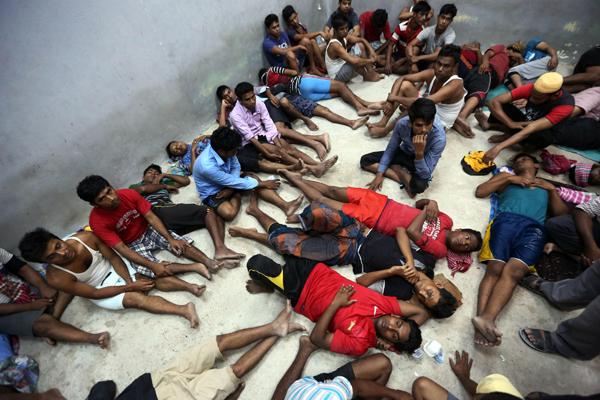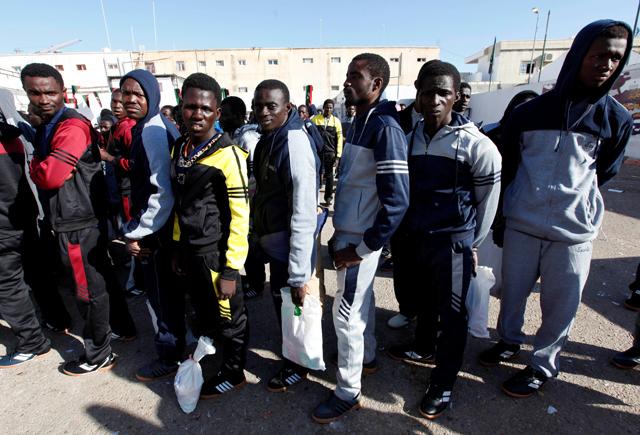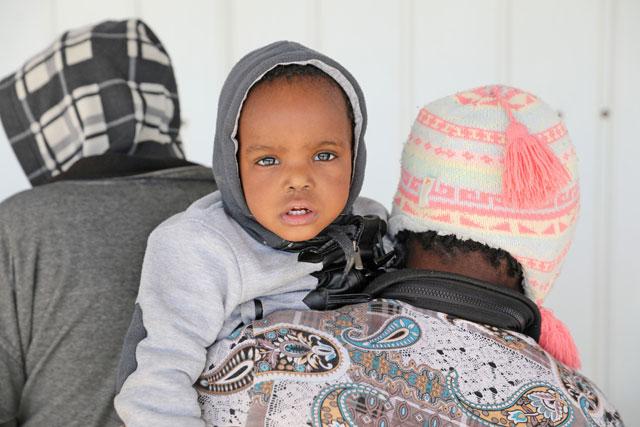You are here
Calm seas, Libya’s lawless state open door for migrant flows
By Reuters - Aug 31,2016 - Last updated at Aug 31,2016

Migrants from Bangladesh rest in a room at the interior ministry's Al Nasr housing centre for illegal immigrants on Wednesday in the port city of Zawiyah, located some 45 kilometres west of the capital Tripoli (AFP photo)
ROME/TRIPOLI — Calmer seas and Libya's lawlessness have again opened the way for smugglers to ship thousands of migrants across the Mediterranean in days, in a striking reminder of how far Europe is from ending the migrant crisis.
In just three days, Italy's coastguard and European vessels pulled more than 10,000 migrants from packed wooden boats and rubber dinghies crossing from Libya's coast through the Strait of Sicily, one of the shortest routes from North Africa.
Images from rescue vessels showed migrants crammed into fragile boats, some in orange life jackets, others jumping into the water to swim as rescuers shouted for them to stop. Many were women and children, most of them Subsaharan Africans.
Around 3,000 migrants were saved in 30 separate rescue missions on Tuesday, 6,600 on Monday, 1,600 on Sunday and 500 on Saturday, according to Italy's coastguard, which coordinates sea rescues between Libya and Italy.
It was not the first flood of boats leaving Libya's coast in a matter of days. Last month, Italian and EU vessels rescued 3,200 people in one day. In June, 3,000 were saved in two days.
Aid agencies, Libyan officials and rescue operators say calm waters after rough winds in July may have prompted smugglers to dispatch more boats for migrants who can wait weeks for a chance to sail.
"It's not like people were not coming out, but on Monday they came out by the thousands," Nicholas Papachrysostomou, coordinator for Medecins Sans Frontieres (MSF) on board the Dignity 1 rescue ship, told Reuters.
"In the 10 days before this weekend, we didn't rescue anyone, or very few. It wasn't bad weather, but there were 1 metre to 1 1/2 metre waves. The rubber boats won't come out in those conditions."
In Tripoli, naval authorities say they are undermanned and ill-equipped. Years of conflict and chaos have left their naval and coastguard services in tatters.
Since the 2011 NATO-backed revolution toppled Muammar Qadhafi, Libya has descended into chaos, with rival governments and armed factions battling for control, leaving both migrant smugglers and militants space to expand.
"This is the season for illegal migrants. The calm seas have helped them take advantage," said Ayoub Qassem, a spokesman for Libya's naval forces in Tripoli. "Also our vessels are in severe need of maintenance and spare parts to operate again."
Sudden spike, steady flow
Still, this week's rescues were on a huge scale. On Monday, when some 6,500 were rescued, the Dignity 1 responded to a distress call for a large wooden boat in the morning.
After they had pulled more than 600 migrants off that boat, MSF's Papachysostomou said he saw more.
"We realised that around us there were a number of rubber boats appearing," he said. "These boats just appeared on the horizon. At about noon you could see rubber boats everywhere, in 360 degrees. We counted 18 to 20, with each carrying 120 to 130 people."
The International Organisation for Migration said around 105,000 migrants had reached Italy by boat in 2016, many sailing from Libya.
An estimated 2,726 men, women and children had died over the same period trying to make the journey.
Still, this week's surge may also be due to the situation in Libya. Smugglers may try to avoid armed rivals or police by shipping as many people as possible when they can, said Carlotta Sami, spokeswoman for the UN refugee agency in Italy.
"There are moments in which no one leaves from Libya, and then there are moments in which there's a surprising peak in departures...It's like a roller coaster."
A new UN-backed government is in place in Tripoli since March, but is struggling to end factional fighting and impose its authority over hardliners.
With European naval vessels patrolling international waters, smugglers elude authorities by launching their boats from varied locations.
Remote beaches along some parts of Libya's coast are sometimes littered with clothing, bottles and shoes migrants have left behind; or the wooden bases of inflatable rafts.
"Most of our patrol vessels do not work at the moment," Tripoli naval officer Qassem said. "So we can not patrol in the western region of Tripoli where most of the boats of illegal migrants set off."
Related Articles
TRIPOLI — Four suspected migrant smugglers were killed in an exchange of fire with the Libyan coastguard off western Libya on Thursday, spok
TRIPOLI — Libya's coastguard and an international charity ship picked up several hundred migrants on Saturday, as smugglers trying to take a
ABOARD AQUARIUS RESCUE SHIP — International charity ships and Libya's coastguard and picked up several hundred migrants on Saturday as smugg














